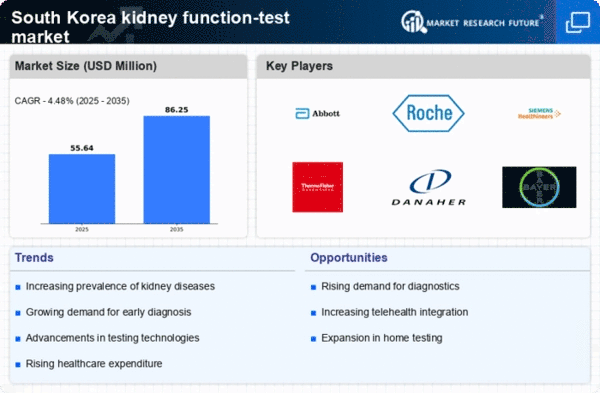Government Initiatives and Funding
Government initiatives aimed at improving healthcare infrastructure and funding for kidney health programs are pivotal in shaping the kidney function-test market. In South Korea, the government has implemented various policies to enhance early detection and treatment of kidney diseases. For instance, increased funding for public health campaigns and subsidized testing services has made kidney function tests more accessible to the general population. This proactive approach not only raises awareness but also encourages individuals to undergo regular testing, thereby driving market growth. Furthermore, collaborations between government bodies and healthcare providers are likely to enhance the availability of advanced testing technologies, which could further stimulate the kidney function-test market. As these initiatives continue to evolve, they are expected to play a crucial role in expanding the market landscape.
Rising Incidence of Kidney Diseases
The increasing prevalence of kidney diseases in South Korea is a primary driver for the kidney function-test market. According to recent health statistics, chronic kidney disease (CKD) affects approximately 10% of the adult population, leading to a heightened demand for diagnostic testing. This trend is further exacerbated by lifestyle factors such as obesity and diabetes, which are prevalent in the region. As healthcare providers emphasize early detection and management of kidney-related issues, the market for kidney function tests is expected to expand significantly. The growing burden of kidney diseases necessitates regular monitoring, thereby driving the demand for various testing modalities, including blood tests and urine analysis. Consequently, the kidney function-test market is poised for growth as healthcare systems adapt to these rising health challenges.
Aging Population and Healthcare Demand
The demographic shift towards an aging population in South Korea is a significant driver of the kidney function-test market. As individuals age, the risk of developing kidney-related ailments increases, necessitating regular monitoring and testing. Current projections indicate that by 2030, over 20% of the population will be aged 65 and above, leading to a surge in healthcare demand, particularly for chronic disease management. This demographic trend is likely to result in a higher incidence of kidney diseases, thereby increasing the need for kidney function tests. Healthcare providers are expected to adapt their services to cater to this growing demographic, which may include the introduction of more comprehensive testing options. Consequently, the kidney function-test market is anticipated to experience substantial growth as the healthcare system responds to the needs of an aging population.
Increased Focus on Preventive Healthcare
The growing emphasis on preventive healthcare in South Korea is a crucial driver for the kidney function-test market. As healthcare systems shift towards proactive management of health conditions, there is a rising recognition of the importance of regular kidney function testing. This trend is supported by public health campaigns that advocate for early detection and lifestyle modifications to prevent kidney diseases. The increasing awareness among the population regarding the benefits of preventive measures is likely to result in higher demand for kidney function tests. Additionally, healthcare providers are incorporating routine screenings into their practice, further promoting the importance of kidney health. As this focus on prevention continues to gain momentum, the kidney function-test market is expected to expand, reflecting the changing attitudes towards health management.
Technological Innovations in Diagnostic Tools
Technological innovations in diagnostic tools are transforming the kidney function-test market. The introduction of advanced testing methodologies, such as point-of-care testing and automated laboratory systems, enhances the accuracy and efficiency of kidney function assessments. These innovations not only improve patient outcomes but also streamline the testing process, making it more accessible to healthcare providers. In South Korea, the integration of artificial intelligence and machine learning in diagnostic tools is gaining traction, potentially revolutionizing the way kidney diseases are diagnosed and monitored. As these technologies become more prevalent, they are likely to drive the kidney function-test market by offering faster results and reducing the burden on healthcare facilities. The ongoing research and development in this field suggest a promising future for the market as it adapts to technological advancements.
















